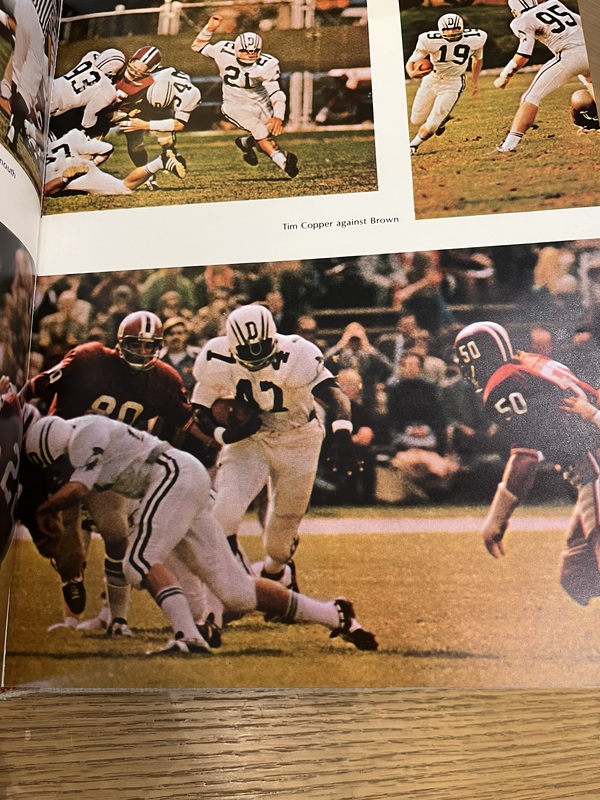Leader Among Leaders: The Dartmouth Years
Stu Simms’ time at Dartmouth was in large part centered around his experience as a member of the football team. He was part of three Ivy League Championship teams from 1969-71, during a period in which Dartmouth won twenty five games and lost only two. Simms faced challenges immediately upon his arrival here in Hanover: With fifteen other running backs as part of his freshman class, the competition to play was sure to be fierce. Simms was able to prove his worth on the gridiron and was elected co-captain for the 1971 season, an appointment that would prove very pivotal to the success of the season. In fact, Simms was the first African-American player to be named a captain in Dartmouth football history.
Nineteen seventy-one was a time of major change in our country, and the Dartmouth football team was no exception. The team had rapidly become more integrated, much like the college itself, and this did not always go over well with some white players. As Mr. Simms explained, “We almost fell apart in 1971 because at one point, we looked like Alabama. In other words, nine of the [eleven players on offense] were African American.” This caused tensions to stir as White players did not receive this well, but Mr. Simms and his co-captain, current Dartmouth football radio broadcaster Wayne Young ‘72, arranged two meetings: one with the coaches, as well as one with the African American players on the team in order to calm the tensions. This is something that worked out tremendously as the team was able to win eigh games and only lose one, winning an Ivy League championship. When recalling the season, Mr. Simms praised “the focus and the determination of the individuals” involved with the team and explained that the character and resolve of the team was responsible for its eventual success.
Racial relations within the football program were not overwhelmingly warm in this time, but there certainly were beneficial relationships. When Thomas Price, an alumnus of the class of 1971 who was a teammate of Mr. Simms and actually helped to recruit Simms to Dartmouth, was interviewed for this project by Jamal Cooney ‘23, he explained that “My senior year playing Dartmouth football was one of the most memorable years of my life and some of those guys I played with, Black and White, are some of my best friends even now. Football and sports in general, are lessons in living.” He would go on to add that, “There are guys who were at Dartmouth then, Black and White, that I am proud to call my friends”.
While united by their common struggles on the football field, Black and White football players were still divided by some factors away from the field during this time. Interestingly enough, Simms would go on to help recruit Wesley Pugh ‘73, a fellow Baltimore native interviewed for this project by Katelyn Zeser ‘22. As Mr. Pugh said, describing his time playing football at Dartmouth, “We tried to, myself and other students of color, get the others, particularly the white teammates, to recognize that while we were doing this, winning football games, and so forth, society was in a tremendous— was just in tremendous turmoil”. Tyrone Bird ‘73 echoed this sentiment in his interview with Stefan Bradley, saying, “We were on a championship football team, in the locker room we were a team, but when we left, they went to the fraternity and we went to the [Afro American Society], and so there was not a lot of interaction as we could have had. We were friends, don’t get me wrong. It’s just that there wasn’t a lot of socialization and engagement among the two sectors, you know."
Simms’ ability to get people on the same page paid dividends and was pivotal to the great results of the 1971 season. He was a leader on a team that desperately needed it. Simms, along with Wayne Young, was able to guide his team through a difficult period of adjustment to more advanced integration, and relieve many of the frustrations players had en route to an 8-1 Ivy League championship season. This foreshadowed the type of skill that Simms would demonstrate in his legal career, as he has dealt with racial matters in a legal setting and been a champion of civil rights and equality.


